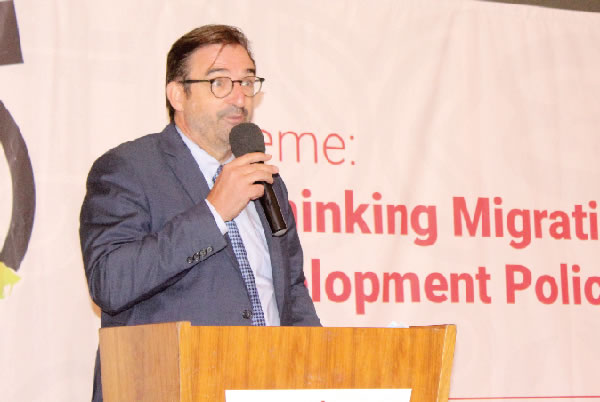
The German Ambassador to Ghana, Daniel Krull, has advised Ghanaians that the best way to migrate legally to Germany is through education and training.
He has, therefore, asked Ghanaians to convince their fellow countrymen not to choose the fatal way of migrating illegally through the Sahara and the Mediterranean Sea.
“We must convince them not to spend their money on facilitators who help them to go through this fatal route. Education can pave the way to legal migration,” he said.
Mr Krull said this in Accra last Tuesday at a gender and migration conference organised by the Ghanaian-German Centre for Jobs, Migration and Reintegration (GGC), with support from Deutsche Gesellschaft für Internationale Zusammenarbeit (GIZ), and in collaboration with the Ministry of Employment and Labour Relations and the Ministry of Gender, Children and Social Protection.
About the conference
Knowing the critical role gender plays in the migration discourse and management, GGC has been incorporating gender in all its activities and the conference, which has been organised annually since 2019 , had been bringing together stakeholders, civil society organisations and professionals to deliberate on the role of gender in migration.
This year’s conference is on the theme: “Rethinking migration and feminist development policies: insight from Ghana.”
Mr Krull said the narrative that migration was a threat to Germany was substantially changing now because Germany was in need of people to come and work to contribute to its wealth and economy.
Quoting German media reports, he said Germany would need about 500,000 new members of the society to share in its future development growth.
He spoke of efforts by the various parties in the German government to adjust migration laws in the country.
Touching on the theme of the conference, the German Ambassador said migration policies were only successful if they were gender sensitive, adding that a person’s sex, gender, identity and sexual orientation shaped every stage of the migration experience, in particular, their choice of destination, the degree of vulnerability and their inclination of family, friends and society to accept their return.
He said the current refugee crisis caused by Russia’s war on Ukraine was a striking example of how gender played a role in migration crisis, pointing out that at a point in time 19 per cent of migrants from Ukraine were females and children.
“We need to stop this war. We need to stop Putin. Russia needs to end this war,” he said.
Rethinking migration
The Deputy Minister of Employment and Labour Relations, Bright Wireko-Brobbey, said rethinking migration was appropriate, considering the fact that migration had been intensifying and diversifying over the last few decades and accelerating in recent times due to major conflicts and regional political and economic shifts.
Quoting UN Women, he said women migrated for diverse reasons, including poverty, conflict, gender-based violence and harassment, pointing out that many female migrant workers were often confined to low-skilled jobs in domestic and care work, hotel and hospitality services.
The Commissioner for Refugee Policy, Director for Displacement and Migration at the Ministry for Economic Cooperation and Development of Germany, Dr Elke Löbel, said the feminist development policy was a political movement that involved everybody including men, women, boys and girls.
For her part, the Director, Centre for Migration Studies at the University of Ghana, Prof. Mary Boatemaa Setrana, said there had been an increase in the proportion of female migrants from Africa.
Source: graphic.com.gh











